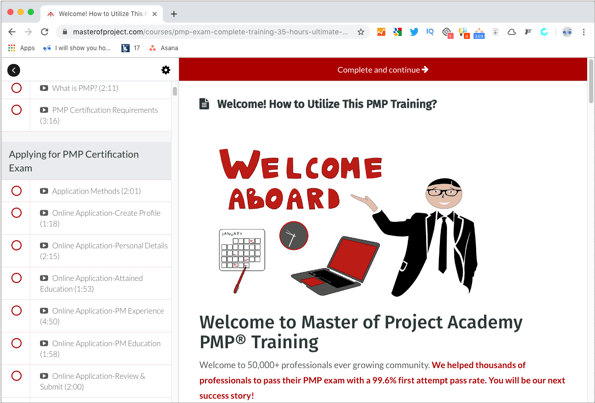I was tired of so much false information on PMP requirements that I reached out to an expert and brought him on for an interview. Ready for you to watch.
The expert is Resit Gulec and he revolutionized the PMP exam preparation process by creating some of the best training videos available and making his students one of the most successful ones (a whopping 99.6 % of his students pass the exam!)
If you’ve been googling for certification training you probably came across Resit’s company, Master of Project Academy. Today they are one of the most respected training providers in the project management industry.
We talk about how Resit started his career, how he became a project manager and what inspired him to launch Master of Project Academy. Then we dive deep into the process for getting the PMP, including requirements.
Content
- Meet Resit Gulec
- Video interview: how to get the PMP
- Why you should care about the PMP
- Is the PMP right for you?
- Step-by-step guide: How to PMP certified
- Conclusion: Summary of the article
Meet Resit Gulec, Master of Project Academy
Resit began his career as an electronics engineer. After some years doing technical work he felt that his role didn’t allow him to use all his talents. He was good a communicating information, managing people and organizing things. That’s when he took his PMP and became a project manager.

Still in his main job, Resit took over a part time assignment as a visiting professor at a local university. The feedback from the students was so positive that he decided to share his content with the public. This is how his company Master of Project Academy was born. To date, Master of Project Academy has helped over 50,000 students from all over the world to become competent project managers and to pass their PMP certification.
Watch the video
0:48 — Resit’s career from engineer to PM to business founder
08:07 — The process to get the PMP
09:30 — PMP requirements
Subscribe to my Youtube PM channel
Why you should care about the PMP
The PMP is one of the most respected project management certifications available. Many top project managers — those who manage multi million dollar projects — from building airplanes, drilling rigs or factories — proudly carry the PMP badge on their chest.
But it’s more than a prestige thing. The PMP is also an indicator for thorough understanding of project management principles and methods. And companies are desperately looking for candidates with this kind of knowledge.
So, if you are serious about going the project management path, you should consider taking the PMP. Everything you need to know about the process you will find here.
Is the PMP right for you?
The deciding factor is your level of experience. The PMP requires you to have a certain minimum amount of project experience (more on that later). It cannot be attained if you decided only yesterday that you want to become a project manager.
There’s another factor to consider. As Resit Gulec explains, some countries have specific preferences with regards to project management certifications, and some prefer other certifications over the PMP. For example in the UK and Germany the PRINCE2 certification is more common. For the rest of the world and especially in North America, the PMP is the best choice in terms of certification.
Does it matter what industry you are in? No, because project management is a skill that’s used in all industries and areas. And the PMP is designed in a way that it is relevant for all fields, whether it’s banking, IT, engineering or research.
Step by Step: How to get your PMP
Once you have decided the PMP is what you want, here are the next steps:
Step 1: Check if you meet the requirements
Whether you’re eligible for taking the PMP exam depends on three main factors:
- Your level of education – There are certain minimum requirements
- Your work experience – You must have worked in projects before, but contrary to popular belief PMI doesn’t expect you to be a project manager already!
- Your project management training – At the time of applying for the PMP exam you must have accrued 35 hours of formal project management training. If you don’t have that yet that’s totally fine!
Let’s have a closer look at each of the requirements — no details left out.
Your level of education – the easy part
You need to have at least a secondary degree, for instance a high school diploma, an associate’s degree or anything that could be considered equivalent. The downside of applying for the PMP exam with only a secondary degree is there’s a higher threshold in terms of work experience: you need to have at least 7,500 hours of project management experience (see the ‘experience’ section below for details).
If you have a four-year degree such as a bachelor or Master’s, getting PMP certified is much easier. With a four-year degree you only need to have gathered 4,500 hours working on projects to be eligible for the PMP.
Does it matter what field you graduated in?
Nope.
A common misconception is that the PMP is specific for IT. This is not true.
Required work experience: Why you don’t need to be a project jedi
This is where people get confused. They believe you must have worked as a project manager for years. But that’s not true as Resit confirms.
“Many PMP aspirants think they must have managed a project to satisfy
their project management experience, which is not true.”
Resit Gulec, CEO Master of Project Academy
What the PMI (the organization behind the PMP) expects expects you to have is to have experience in all of the five project phases:
- initiation
- planning
- execution
- control
- closing
Of course there’s no harm if you were actually in charge of a project. But it’s totally fine if you were just supporting the project in your original role — as an engineer, consultant or whatever role. What matters is that you got involved in some of the tasks that are typical for each phase and hereby gained a good understanding of project management.
“What PMI expects in terms of project management experiences is you could be leading a small part of the team, or you could not be leading any personnel or staff, but you could be doing project management work such as contract management, procurement management or some other project management task.”
Resit Gulec, CEO Master of Project Academy
How to gain the required work experience for the PMP
Suppose you are an engineer and your team is launching a new project. The project manager is terribly busy already, so you decide to help: “Hey, I can help you if you want. I’d like to get into project management myself, so this would be a great opportunity.” Your project manager colleague is really pleased, and over the next days you agree on specific tasks you are going to take over: Getting resource commitments from the teams, creating Powerpoint slides for the project kickoff, sending out reminders, hosting project meetings, tracking work hours and staying in touch with vendors. You are doing this for several projects over the next 3-5 years, and sooner than you can imagine you have amassed 4,500 hours of project management experience. This is the exact number of hours PMI expects you to have assuming you have a 4 year degree (with only secondary education like a high school diploma, associate’s degree or a global equivalent the minimum hours required is 7,500 hours).
What kind of project work you do depends on your job. The only thing that matters is that the hours you gather involve work from all the five project phases. Look at the table below where I’ve listed examples of relevant tasks for each phase:
Build up project experience by taking over PM tasks in each of the 5 phases.
Initiation
- developing a business case
- creating a project charter
- defining roles and responsibilities
Planning
- project planning
- resource planning and getting commitments
- planning out a budget in Excel
Execution
- keeping the minutes
- liaising with stakeholders
- hosting project meetings
- overseeing the design or creation of the final product (or end result)
Monitoring and Controlling
- tracking action items
- sending out reminders
- tracking issues and coordination issue resolution
- checking and approving project work
Closing
- creating the final project status report
- planning and coordinating the go-live phase
- planning handover or training workshops
- hosting lessons learned workshop
Required project management training
You need to attend at least 35 hours of formal project management training. Typically you sign up for a live class or an online training to get to those hours, which are also called contact hours.
Make sure you sign up at an approved training provider like Master of Project Academy. Then you won’t run into problems with getting your 35 hours validated, and you will get a certificate of completion which you can show as proof.
At this stage you don’t have to have accomplished any project management training. This will be the next step – including getting to 35 contact hours.
Check out the PMI website for details on the PMP requirements.
Step 2: Prepare for the exam (and get your 35 contact hours)
Once you’ve confirmed you meet the eligibility criteria, you start to prepare for the exam.
How long will it take you to prepare?
The PMP is a hell of a program to study for! Don’t expect to be exam-ready within a week! In fact, as Resit tells me you may have to spend somewhere between 4-6 months of diligent preparation, putting in 1-2 hours every day. That means you must be willing to make tradeoffs in your allocation of time: less Netflix, less hanging out with friends, more time for yourself where you can focus on studying. How much effort you put in is of course your choice. Some people have passed the PMP exam after a month while others take a year to prepare, Resit says.
“Our recommendation is sparing around four to six months to get ready for the PMP exam, especially if you are working as a full time professional.”
Resit Gulec, CEO Master of Project Academy
Discipline isn’t the only factor that determines your preparation effort. Work experience matters too. If you’ve managed projects before many of the concepts and methods taught in the program will be familiar to you. For example, you will know what a risk register is and how to identify stakeholders for your project. With this knowledge, you can go through the study material faster than someone who has only limited project management experience.
Form of training and required material
There are specific training programs that prepare you for the PMP exam. Both online and live classes exist. If you prefer being in a room with an instructor, check out your nearest community college or university for PMP exam preparation classes.
Many of you prefer online training because of the greater flexibility. You can study at your own pace and you spare yourself the drive to the training facility.

How Master of Project Academy can help you get PMP certified
Many of you want to get the PMP, and you like the convenience of online training. That’s why I reached out to Resit Gulec. His company Master of Project Academy is one of the leading training providers for PMP exam preparation. And they are also one of the best:
Our students have a 99.6 % exam pass rate, which is industry leading.
Resit Gulec, CEO Master of Project Academy
The video-based online PMP prep program offered by Master of Project Academy take you through all topics of the PMP exam. You will learn everything there is to know about scope management, planning, communication, stake management and all the other knowledge areas. This is exactly what you need to learn if you want to go from where you are now to managing big projects. Their courses go really deep into the subject matter and are taught by seasoned project managers like Resit Gulec himself or Bill Lewis, a retired Lieutenant Colonel from the US Army. Click here for Master of Project’s PMP training course and save 50% (Note: This course prepares you completely for the PMP exam and you will earn your 35 contact hours)
In terms of learning tools, Master of Project has done a great job packaging their material in a variety of ways. By signing up to one of the their preparation courses, you get access to:
- video lectures
- flash cards
- practice questions and sample exams
- cheat sheets
As a reader of Tactical Project Manager you can get the PMP exam training at 50% off the original price.
Sample exams are great to assess your readiness for the exam. And with the downloadable flashcards you can practice exam questions on your smartphone – whether it’s at lunch break, on the train or while waiting in a queue.

As a plus, Master of Project’s PMP training course also explains every step of the PMP application process. This is really helpful because the application process can be quite overwhelming, and having someone guide you through the process also helps you avoid mistakes.
To answer the initial question on what material you need to prepare for the PMP: If you choose an experienced and approved training provider like Master of Project to prepare for the PMP, you don’t need to buy any other material. You can study at your own pace and take the exam whenever you feel ready.
Looking for a book?
Some of you prefer books to supplement the digital material. For those I recommend you get the PMBOK Guide (the Project Management Body Of Knowledge) — the book that summarizes (if you can say this for a 700+-page book) the entire PMI project management methodology.
Are you going to prepare forever?
No! After some months of study you’ll feel you are finally getting it. The concepts begin to make sense and you start to connect the things you’ve learned. And after numerous rounds of flashcard (they are included in the PMP prep course by Master of Project) the material starts to stick.
“If you can score more than 70% of the PMP practice questions,
you can very well get the PMP in your first attempt.”
Resit Gulec, CEO Master of Project Academy
Now you will feel that getting the PMP actually seems achievable.
This is the right time to apply for the exam.
Step 3. Enter your application for the PMP exam
Stretch your arms and legs, take a deep breath and then make yourself comfortable at your PC. You are going to sit for at least an hour to enter your application. To get through the process as quickly as possible, I recommend you have all your documents ready:
- an up-to-date CV
- degree certificates
- your course completion certificate for the project management class you’ve taken
(Remember: you must have accrued 35 hours of formal project management training by the time you apply. If you haven’t done that yet, get your 35 contact hours now. Master of Project as an accredited PMP training provider can help you and will issue a course completion certificate.)
Next, go to PMI’s website to create your account and to submit your application.
PMI asks for bit of information: Apart from your name and contact details they also want detailed information about your education and work experience — including projects you have worked on, your history of employment including specific dates and roles. Finally, you also have to share details on any project management training you have taken — with specifics about the training provider.
Don’t rush through the process and make sure all data entered is correct!
Finally, click “Submit” and send your application to the PMI.
Congrats!
Will your application get audited?
Many applicants fear they may get audited for their credentials and experience. As Resit confirms, PMI does audit incoming applications. However this is done on a random basis, and if it happens to you it doesn’t mean you did anything wrong. But of course, always enter factual details about yourself and don’t cheat.
Step 4: Application Review and Payment
As next step, PMI is going to review your application. They want to confirm you actually meet the eligibility criteria. The review takes between 5-10 days according to the PMI website.
Once your application has been reviewed and approved, you will receive an eligibility confirmation as well as further details on the process, including test arrangement.
The final step in the PMP application process is payment. You only pay after it’s been confirmed you are eligible for taking the PMP.
Step 5: Register at the nearest test center
After your application has been confirmed eligible by the PMI, you should make an appointment at your nearest test center. A bit of explanation is needed here.
The PMP exam can be anywhere in the world, no matter if you’re based in Argentina or Zimbabwe. Tests are held in dedicated test centers run by Prometric, which can be found in any major city.
You don’t have to research by yourself. PMI will email you details about test scheduling and test locations after your application confirmation.
Step 6: Take the exam
The big day! You are going to take the exam you spent so much time studying for. No need to worry if you did all the work, went through the exercises and gauged your skills via sample exams.
What if you fail the exam? Your application allows you to take the exam up to three times in one year, because this is how long your eligibility status is valid for.
The Bottom Line: Getting PMP certified is easier than you think
The PMP is actually more achievable than people think. You don’t need to have worked as a project manager before. The key is that you have done project management work in the 5 major project phases – project initiation, planning, executing, monitoring and closing.
The biggest hurdle you need to overcome to get the PMP is actually … surprise, surprise … yourself! You must be willing to dedicate several months towards intensive study so that you will pass the exam.
What will definitely increase your odds of success is having a trusted training partner at your side who can provide you with proven material that goes beyond just sharing concepts, but which actually explains the practical application of those concepts in real life. This is why I recommend taking a look at Master of Project’s PMP prep course (they have a 99.6 % student exam pass rate).
Note: This article contains affiliate links. This means I get a commission of each sale at no extra cost to you. I only endorse products I stand behind 100% and where I know they will benefit you.
Author
-
Hi, I’m Adrian, a Senior Project Manager and the Creator of Tactical Project Manager, where I teach a pragmatic approach to project management. Led large-scale IT and business projects for over 10 years. My goal is to enable you to lead any project with confidence.
View all posts




